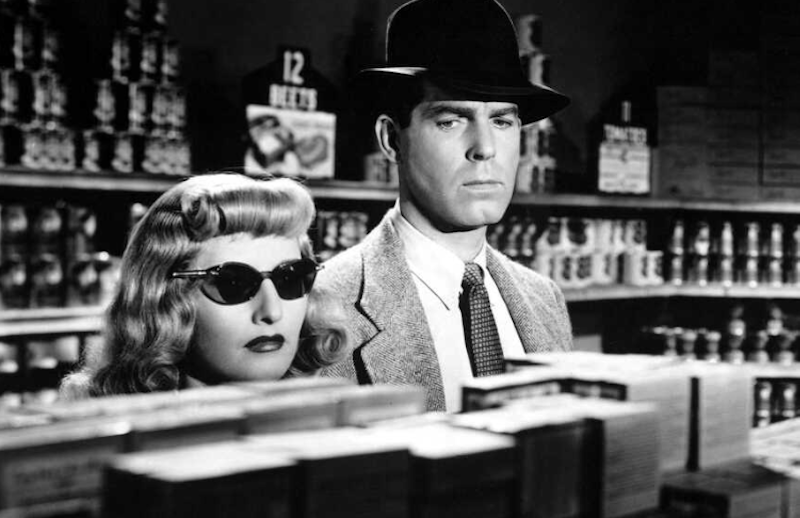Billy Wilder’s Double Indemnity (1944) is the definition of film noir. Most of the film’s elements became a blueprint for others to follow, including many neo-noirs, such as Lawrence Kasdan’s Body Heat (1981). Most noir films carry within them the anxiety and uncertainty of the war, even if such matters aren’t discussed. There’s a pervasive feeling of dread and the inevitability of doom.
Everyone who was involved in the making of the film reflects its perfection. Under Wilder’s direction and script (which was done in a rather uneasy collaboration with Raymond Chandler), John F. Seitz’s cinematography, and Edith Head’s costumes, Barbara Stanwyck plays Phyllis Dietrichson, a bored housewife, stuck in a meaningless marriage to a meaningless and unimaginative man. A chance encounter with Walter Neff (Fred MacMurray), an insurance salesman, changes both Phyllis’ and Walter’s lives.
Aiming to sell a larger insurance policy to Phyllis’ husband, Walter strikes up a conversation with Phyllis, which is filled with double entendre and implications that lead the pair into a tragic end. Walter’s immediately attracted to Phyllis and makes no qualms about suggesting an affair. While Phyllis at the beginning plays hard to get, she soon realizes that Walter can be useful. The pair concoct a plan to murder Mr. Dietrichson and collect accident insurance—a double indemnity if the accident happens on the train.
Everything goes according to the plan but there was one thing that both Walter and Phyllis were not counting on—Baron Keyes (Edward G. Robinson). Keyes is Walter’s superior at the insurance company, and the two men share a good friendship, with Keyes acting like an older brother to Walter, always looking out for him.
Something stinks about this insurance claim and Keyes isn’t letting it go. He’s sure that Phyllis is complicit in the murder of her husband but knows that there was another person working with her. At first, he employs Walter’s talents to get to the bottom of the case, which naturally makes things uncomfortable for Walter. He tries to dissuade Keyes that there was any foul play but Keyes tells him that he’s seen such phony claims before. “How do you know?” asks Walter. “How do I know?,” says Keyes. “Because my little man tells me… it ties the knots in my stomach.”
Stanwyck’s performance takes center stage in most of the scenes as does her interaction with Walter. She’s icy and loving, and there’s never really a way of knowing whether she’s fully manipulative. She is self-centered however, and only interested in her husband’s money. When Walter murders Mr. Dietrichson in the car, Wilder chooses not to show it. Instead, the focus is on Phyllis’ face: a suggested smile, pure satisfaction, and wonder about the consequences.
Despite all of this, the thread that holds the film together isn’t the relationship between Phyllis and Walter, but between Keyes and Walter. It is to Keyes that Walter’s narrating his crime, it is Keyes that Walter’s trying to evade, it is Keyes’ opinion that Walter cares for. Just as he became intertwined with Phyllis, Walter is inextricably connected to Keyes.
Edward G. Robinson steals the show, a “habit” that he developed throughout most of his career. No matter whether it was a minor or major role, Robinson didn’t just deliver his lines impeccably, but also memorably. Almost all of the meaningful and powerful dialogue in Double Indemnity comes from Robinson’s character. Keyes is Walter’s moral conscience that he’s attempting to evade.
While Phyllis and Walter lack any regard for ethics, there’s also a more interesting element at play. Despite being married, Phyllis is acting as a loner, and Walter clearly isn’t what you’d call a family man. They’re both lost and groundless. They pretend to have the power in front of others (including each other) but in reality, they’re weak and hardly human. At one point, after the murder, Walter narrates that he couldn’t hear his own steps as he was walking. He’s effectively a ghost or at least, a half-human.
Juxtaposed to such shape-shifting consciousness of Phyllis and Walter is Keyes. He understands his position in society and in the company, but regardless of the hierarchy, Keyes is a man who’s completely secure. It’s not just the years of working in insurance and knowing how to spot a phony that has rendered him tough but one gets a sense that Keyes has lived a difficult life. Yet what does he live for? To catch the phonies? Is this his reason for being?
Throughout the film, Keyes is always smoking a cigar (an image correctly associated with Robinson as well), yet can never find any matches. It’s Walter who always lights his cigar, and this becomes a motif in the film, a sign of a great friendship. The poignancy of the film’s end gets under the skin and goes beyond noir. As Walter can barely move (shot by Phyllis), he tries to light his cigarette. He’s unable to and in a final sign of affection, love, and friendship, it’s Keyes who strikes a match.
“Know why you couldn’t figure out this one, Keyes?,” says Walter. “I’ll tell ya. ‘Cause the guy you were looking for was too close. Right across the desk from ya.”
“Closer than that, Walter,” says Keyes with a look of sadness. He got his man, just as he always does, but he lost a friend.

